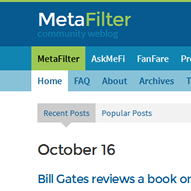Online Community MetaFilter Charges $5 for New Accounts
 The other day I wrote about qualifying new members and the idea of making it harder for people to register on your community. A highly visible example of this is MetaFilter, a 15 year old, well known online community that has charged a one-time $5 membership fee for ten years. They also make you wait one week before you can create a new post. You can respond to posts by others, but not start your own.
The other day I wrote about qualifying new members and the idea of making it harder for people to register on your community. A highly visible example of this is MetaFilter, a 15 year old, well known online community that has charged a one-time $5 membership fee for ten years. They also make you wait one week before you can create a new post. You can respond to posts by others, but not start your own.
A lot of community managers would be scared to even attempt such a thing. Clearly, it has worked for MetaFilter, or they wouldn’t have done it for so long.
I mentioned this in my initial post, but it bears repeating: a measure like this is meant to mitigate the challenges of success. If no one wants to join your community for free, then no one is going to want to join it for $5.
MetaFilter began with free registration, but as the site grew, founder Matthew Haughey would turn registration off for extended periods. As he explained, “dealing with new user disruptions was a major time suck on my limited abilities.” Signups would be turned off whenever they received a big press mention or when their servers were receiving more traffic than they could handle.
With registration closed, he would receive emails every day from people who wanted in. He discovered that some MetaFilter members were selling their accounts on eBay, capitalizing on the desire that others had to join. This led to Haughey’s decision to re-open registration with a $5 fee.
In doing so, he was able to address a few key challenges:
- As MetaFilter grew, it cost more money to keep it online and required more time to manage. The $5 registration fee helped make those investments more feasible.
- $5 is a big enough barrier to entry that it’ll discourage most drive-by users or people who just want to quickly cause trouble. But it isn’t so big a barrier that dedicated people will be driven away. Those are the people Haughey wanted, at the end of the day. Good people could still get in.
- Problematic people still did – but there was a lot less of them. By blocking more of those casually interested users, the management burden associated with those users would be lessened. “No big rush of newbies when an article hits,” as he put it.
“Bigger isn’t always better” is an oft-repeated phrase. It’s true for online communities. More often they not, they are about culture, not numbers. We have this great thing. How do we keep this great thing going while also connecting with other people who will enjoy this great thing? That’s the mission.
